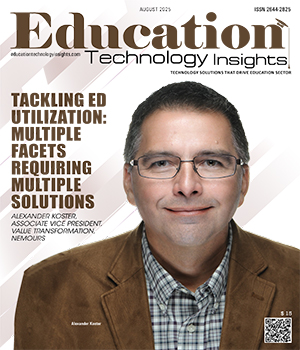THANK YOU FOR SUBSCRIBING
Be first to read the latest tech news, Industry Leader's Insights, and CIO interviews of medium and large enterprises exclusively from Education Technology Insights
When Identity Meets Innovation: Helping Students thrive Beyond the Transcript
Toby J. Brooks, PhD, MBA Director, Academy for Teaching & Learning; Clinical Professor, Robbins College Baylor University
 Toby J. Brooks, PhD, MBA Director, Academy for Teaching & Learning; Clinical Professor, Robbins College Baylor University
Toby J. Brooks, PhD, MBA Director, Academy for Teaching & Learning; Clinical Professor, Robbins College Baylor UniversityToby Brooks, PhD, LAT, ATC, CSCS, is the Director of the Academy for Teaching & Learning, a Clinical Full Professor, and a learning and performance scientist at Baylor University in Waco, Texas. He is also the host of Becoming UnDone, an Apple Global Top 10 Education and Self-Improvement podcast. With a background in athletic training, strength and conditioning, education, and leadership, he helps high-achievers rebuild when identity, burnout, or life disruption threatens to undo them. In addition to his work at Baylor, he is also a speaker, an author, and an executive coach who is passionate about helping to shape resilient learners who thrive beyond the metrics.
The Fragility Behind Achievement
The most dangerous myth in education today is not that technology can replace teachers.
It’s that performance is synonymous with identity.
As an administrator, professor, and performance scientist, I’ve spent years working with high-achieving students and athletes. These are young people who excel in classrooms, on fields, and in labs. But scratch beneath the surface, and you’ll often find a hidden fragility: their entire sense of self tethered precariously to achievement. Inevitably, when that performance falters, the fallout can be devastating, particularly for those who have never been taught how to fail well or to fail forward.
It’s a lesson I’ve learned the hard way more than once.
As a high school senior, I lived for basketball. It wasn’t just a game. It was me. When I finally confronted the reality that my hopes and dreams of playing in college were over, I was gutted. I wasn’t grieving the loss of a sport. I was mourning the loss of who I thought I was. I had no framework for failure, no vocabulary for reinvention, and for a time, no Plan B.
Decades later, I see echoes of that same crisis play out in my students and others across higher education. Many are bright and accomplished. But for too many, the high GPA, the acceptance letters, and the accolades become their core identity rather than just the products and artifacts of their work.
It’s a dangerous place to live.
The Role of Technology and Connection
Our systems reinforce it. Educational technology, for all its incredible advances, often becomes a mirror that reflects metrics but not meaning. We’ve transformed access, delivery, and engagement. We’ve become proficient at tracking KPIs, including attendance, standardized test scores, and engagement rates. Data dashboards, GPA trackers, and AI feedback tools have all been designed to measure and reflect the data. However, in the process, have we subtly (and sometimes not-sosubtly) reinforced the message that what you do is more important than who you are?
We know tech can scale content. But can it foster connection? This, to me, is where education must evolve. Not just in how we teach, but in what we model and prioritize.
Because educators don’t just teach content, we embody values. If we want students to embrace curiosity over perfection, we must show them first-hand what that looks like. If we want them to develop a growth mindset, we must normalize struggle. If we want them to explore who they are apart from their résumé, we must be willing to be vulnerable enough to speak openly and honestly, not just about the messiness of reinvention but about what it has taught us and how it has shaped us.
Without question, technology will continue to revolutionize learning. However, it must also be humanized by teachers and leaders who understand that true learning includes confusion, doubt, failure, and comeback. We must not build systems that teach students to perform better. We must build cultures that invite them to become better.
Cultivating Purpose Beyond the Metrics
That means giving students tools to navigate ambiguity. Language to process uncertainty. And opportunities to fail in ways that lead to learning rather than shame.
We can’t just track performance.
We have to cultivate purpose.
Some of the most powerful moments in my classroom have had nothing to do with the curriculum. They came when a student asked, “What if I don’t know what I want to do?” Or confided, “I’m afraid I’m not enough.”
That’s where the real work happens. In the pauses between bullet points. In the space between the metrics.
At its best, educational technology can help unlock student potential. But it’s our job as educators to remind them: potential is not a performance. It’s a process.
A messy, beautiful, nonlinear process of becoming.
And sometimes, the most important grade isn’t the one that shows up on the transcript. It’s the one no system can measure: Who are you becoming?
Read Also
When Identity Meets Innovation: Helping Students thrive Beyond the Transcript
Advancing Organizational Learning and Leadership in Community Colleges
Purposeful Leadership Through Professional Development
Pedagogical Implications of Chatting with AI to Learn
Advancing Higher Education through Data-Driven Innovation and Generative AI
Cultivating a Trust-Driven Technology Culture in K-12 Education

I agree We use cookies on this website to enhance your user experience. By clicking any link on this page you are giving your consent for us to set cookies. More info

However, if you would like to share the information in this article, you may use the link below:
www.educationtechnologyinsightseurope.com/cxoinsights/toby-j-brooks-nid-3506.html






















